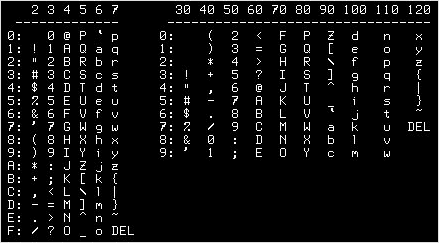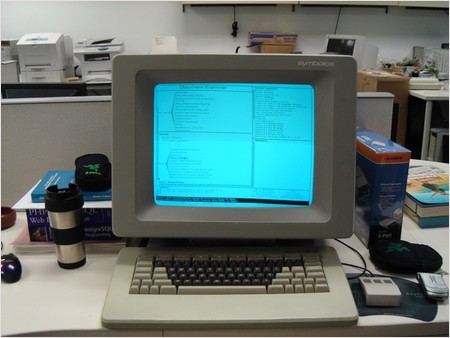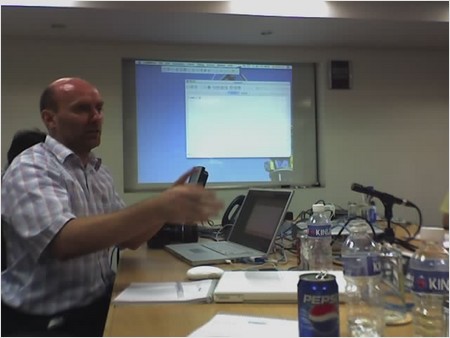Find within a condensed version of this summer's comp.lang.lisp, for your convenience.
The newsgroups comp.lang.lisp.franz and comp.lang.lisp.x are finally being removed, after almost 20 years.
A Symbolics 3620 was put up for sale, as well as a MacIvory I & III with a Quadra 950.
Frédéric Jolliton posted a little implementation of Python-like generators based on the CPS transformer from Arnesi:
Some examples using the code below:
(defgenerator some-numbers () (loop for i from 1 upto 3 do (yield i)) (print 'some-message) (loop for i from 8 upto 9 do (yield i)))
Jeff Shrager posted links to his ILC 2005 paper, “KnowOS: The (Re)Birth of the Knowledge Operating System” along with slides and audio from his talk.
Jeff also posted a link to what he called the “world's best lisp job”, which looks to be designing underwater robots for the Monterey Bay Aquarium Research Institute.
Rainer Joswig spoke at the Bangalore Lisp Users' Group. He appeared to have been a hit.

juanjo@eurogaran.com has recreated the Lisp Machine font.
Marc Battyani, Pascal Costanza, Arthur Lemmens and Edi Weitz announced the creation of the Common Lisp Document Respository (CDR):
What?
The Common Lisp Document Repository is a repository of documents that are of interest to the Common Lisp community. The most important property of a CDR document is that it will never change: if you refer to it, you can be sure that your reference will always refer to exactly the same document.
Why?
There have been a number of attempts to establish a standardization process for Common Lisp after it has been officially published as an ANSI standard. The ANSI standardization was very costly and very time consuming (according to http://groups.google.com/group/comp.lang.lisp/msg/15248a1b11c5a603 it took nearly 10 years and at least $400K).
The goal of the Common Lisp Document Repository is to be more light-weight and more efficient. We focus on one aspect of standardization: the ability to refer to a specification document in an unambiguous way.
I don't get it either, but maybe this is just the first step in their plan.
Posted by jjwiseman at August 16, 2006 03:34 PMThat's a lot easier than having to read comp.lang.lisp. (I'm still mastering the art of avoiding the crap.)
Posted by: Geoff Wozniak on August 16, 2006 08:39 PMI don't get it either, but maybe this is just the first step in their plan.
Not being privy to their plan, but I'm thinking of it as parallel to the Internet RFC archive: in principle anyone can write an RFC, it gets a number, and then other people decide whether where and how to adopt it. In practice there are layers of IETF and IANA and stuff like that which have grown up on top of it to provide process, but becaue they're "layered" they can change as time goes by and the need for them changes, without breaking the underlying repository.
We've tried the "do everything at once" approach (CLRFI, and substandards - remember those?) already without notable success, so maybe this small-steps approach will be more fruitful
The original Internet RFCs followed this process. Originally, they were just memos in the style of "this is the protocol I wrote; if anybody wants to interoperate, do it like this." That's why they were called something simple like a Request for Comment.
Later, when the Internet started to get *BIG*, they changed the process so that you now have to get approval for things to actually become an RFC. An Internet Draft (ID) is a pre-RFC proposal for something that has yet to work its way through the formal RFC standard process.
What's humorous is that the IETF has become the thing they originally tried to avoid: a standard committee.
I think the CDR guys are seeing that nobody has done anything with the CLRFI process and deciding that perhaps something even lighter weight would help. At a minimum, it could help centralize all the various bits of CL documentation floating about in the world, putting it all on a persistent server.
Posted by: Dave Roberts on August 17, 2006 02:21 PM
